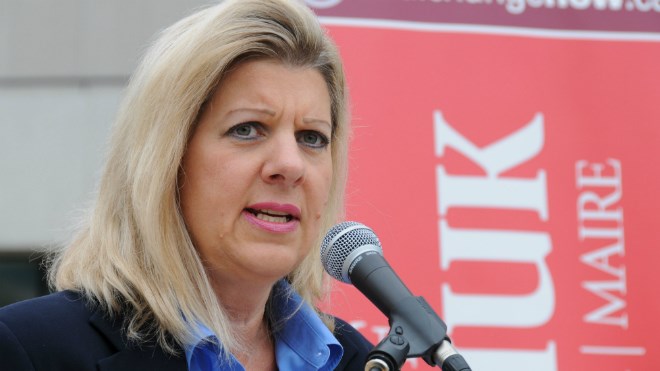When she first brought it up with the minister of Municipal Affairs, Greater Sudbury Mayor Marianne Matichuk was almost a lone voice calling for recall legislation.
At that August 2012 meeting with Kathleen Wynne, who has since become premier, Matichuk was told that unless there was widespread demand for it, recall legislation was unlikely to ever happen.
“(Wynne) did compliment me for bringing it forward,” Matichuk said at the time. “But because of the way the political process works, if a lot of people aren’t speaking about it, it’s not really an issue.
“I have been talking to a few mayors, and have gotten a little bit of support ... But there would have to be a lot of mayors coming forward and saying that this is something that we really want.”
Then the Rob Ford scandal happened. Toronto's mayor, who admitted to smoking crack cocaine on video during one of his “drunken stupors,” has made it clear he has no intention of resigning, even with the release of another video on Thursday, in which an agitated and profane Ford threatens to kill someone.
Tory MPP Randy Hillier introduced a bill late last month calling for recall for provincial politicians. On his webpage, Hillier said he's surprised by how much interest the idea has garnered.
“While I expected many of my supporters and constituents to be very interested in this Legislation, I was pleasantly surprised by the amount of media attention it received,” Hillier wrote. “Even CBC Radio contacted me and asked if I would be interested in doing a 30-minute panel discussion on this bill.”
Hillier’s bill would let voters recall an MPP if they get signatures from 25 per cent of the number of people who voted in their riding in the last election. They would have two months to collect the signatures.
With about 50,000 votes cast in most ridings, at least 12,500 signatures would need to be collected to recall a sitting MPP.
The bill would prevent recall campaigns a year before or after an election. If successful, a recall vote would be held and the MPP in question would be allowed to run again.
Matichuk said this week it's time for similar legislation for politicians at all levels — local, provincial and federal.
“I have to say that I've been looking at the newspapers in the past couple of months and seen some serious, serious public trust issues — federal, provincial, municipal,” the mayor said Wednesday evening following a lengthy city budget meeting. “I really think (recall legislation) is something that should be in the Municipal Act.”
While recall laws are common in the United States, only British Colombia has passed legislation in Canada. Since coming into effect in 1995, there have been 24 petitions calling for recall. Twenty-three of the petitions failed because they failed to attract enough votes, while the 24th ended when the provincial MLA resigned.
While it hasn't resulted in a B.C. Politician's ousting, Matichuk said it's an important fail-safe all voters should have access to as a means to get rid of someone that has lost the public's confidence.
“It needs to be in there,” she said. “That's the only recourse people have, except for an election. And sometimes three years later, it's too late.”
She said it “frightens” her that someone in Ford's position can continue despite all the publicly embarrassing revelations.
“I think you have public trust when you are elected, and there's a certain level you must maintain and if you break that, and your whole community is upset about it, they should have some recourse,” she said.
“That actually is something that ... everybody thinks (can be done), but only the States and B.C. have it — there's nothing in Ontario. Well, I think it's time. It needs to happen.”
When she brought the idea to a vote at city council in September 2012, she was the lone vote in favour. Objections centred on a few issues, including the cost of holding a byelection if someone was successfully recalled, the fact that elections are already held every four years, and the argument that politicians operating under recall legislation are likely to shy away from making tough decisions.
Ward 6 Coun. André Rivest questioned whether the issue is important to anyone other than the mayor. He said people are concerned about housing, roads, snowplowing, etc. He doesn't hear people talk about recall legislation.
"That's what elections are for," he said. "This is not a good way to respect the taxpayers of Sudbury."
Under municipal rules, a failed motion can only be brought back to council if it's moved by someone who voted 'no' the first time, and if it's supported by two-thirds of council. When asked if she's aware of any discussion of bringing the motion back for another vote, Matichuk responded with a “no.”
Join Sudbury.com+
- Messages
- Post a Listing
- Your Listings
- Your Profile
- Your Subscriptions
- Your Likes
- Your Business
- Support Local News
- Payment History
Sudbury.com+ members
Already a +member?
Not a +member?
Sign up for a Sudbury.com+ account for instant access to upcoming contests, local offers, auctions and so much more.
